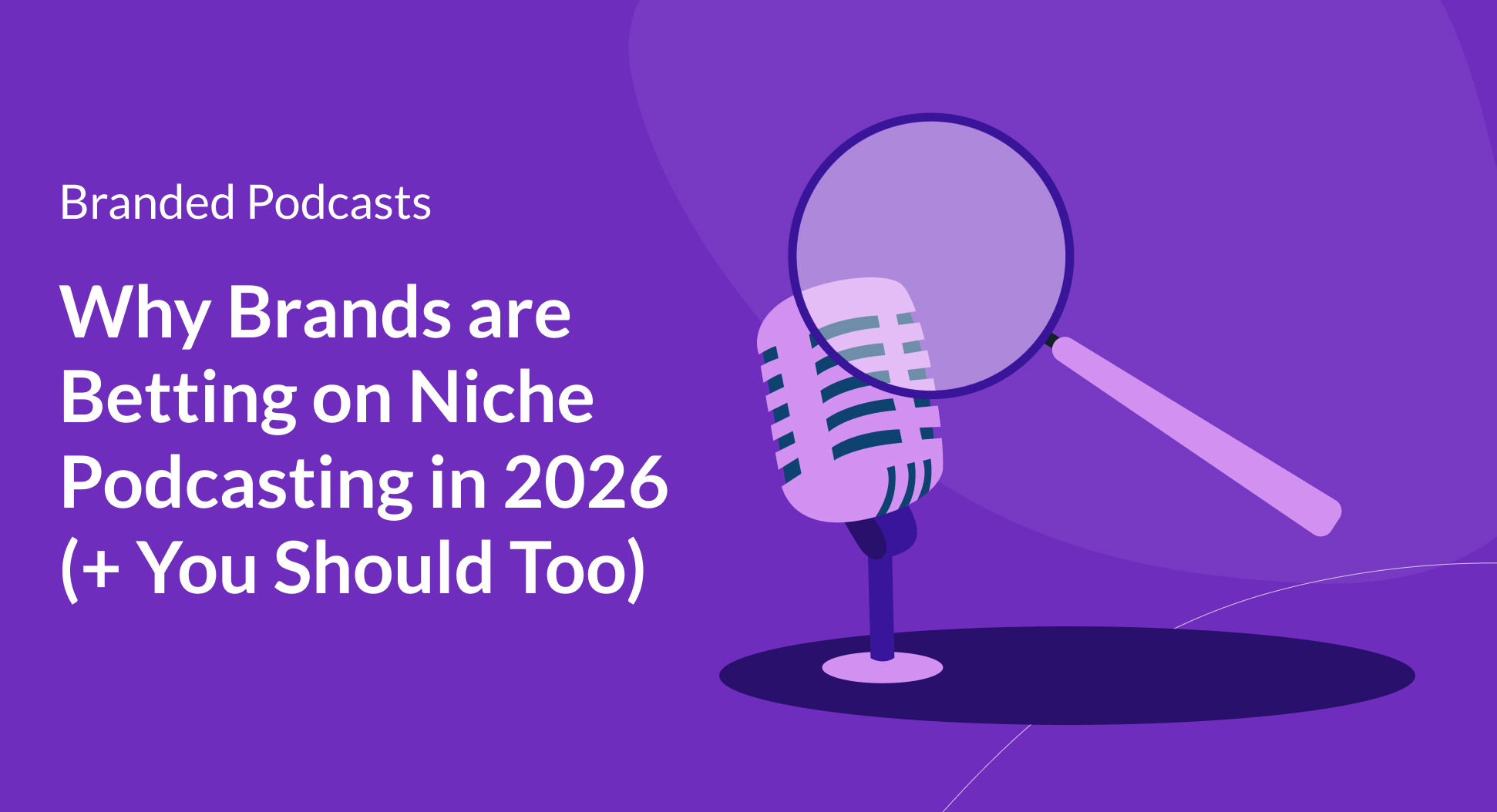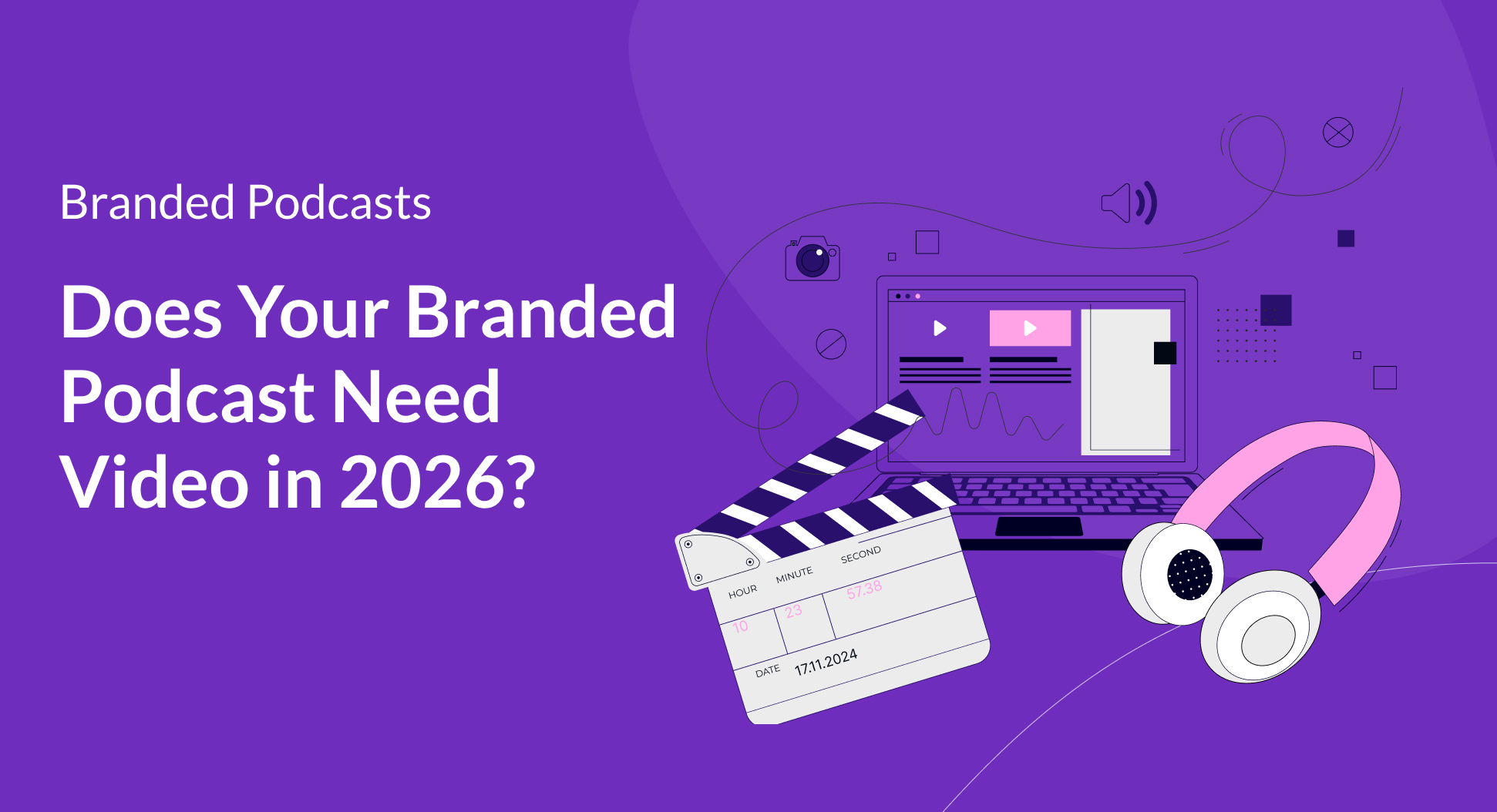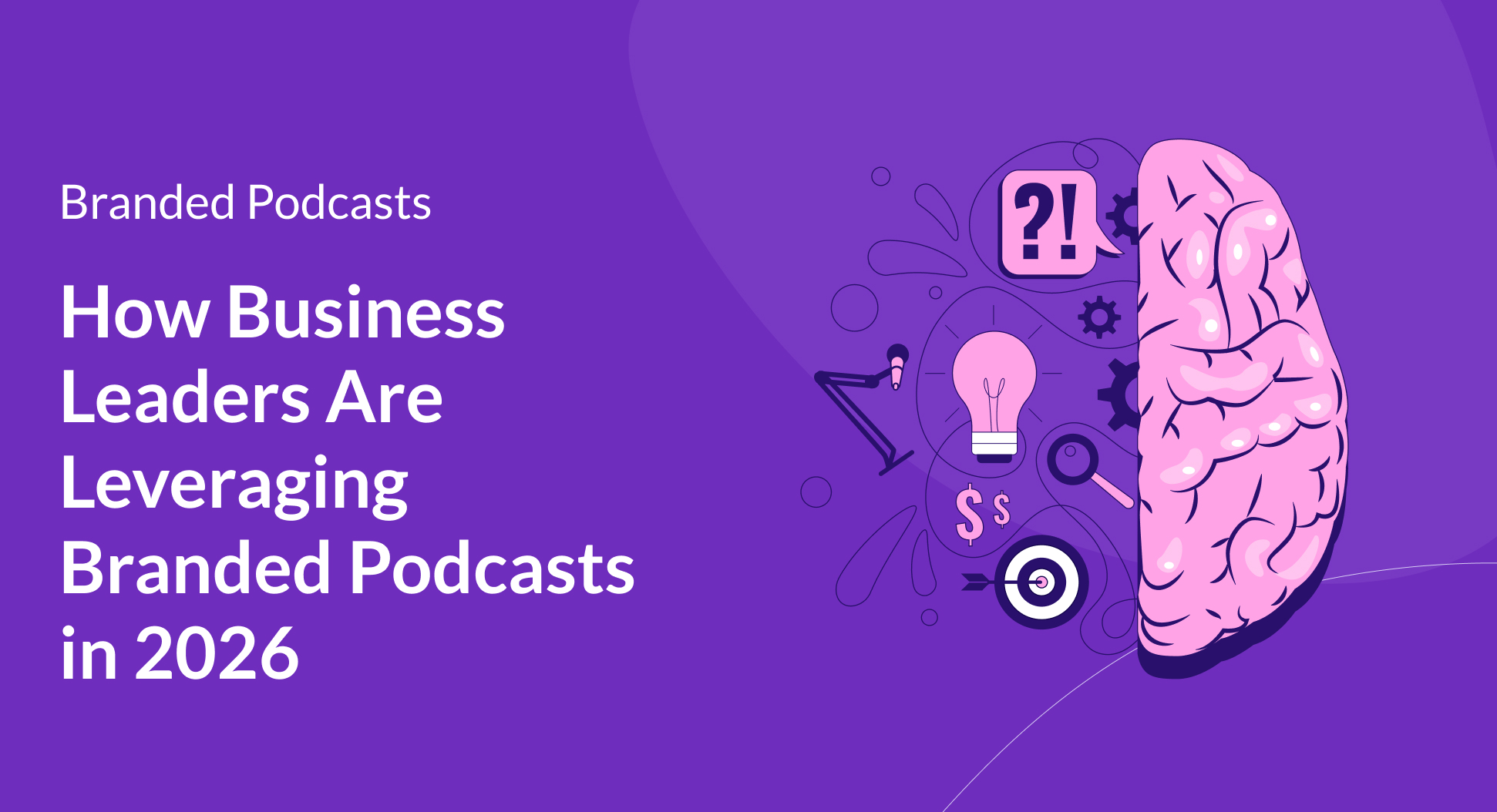Contents
You won’t be the first (or the last) to wonder: Is my company too boring for a branded podcast?
Let’s be real for a second: It's not your industry. It's your approach.
We’ve seen it time and time again:
- You’ve got the expertise.
- You’ve got the resources.
- But you’ve somehow managed to create something that only your marketing team and a few internal Slack threads will ever truly care about.
And no, it’s not because your company sells insurance, payroll software, or highly technical B2B widgets. It’s because you’re designing your podcast to serve your org chart instead of your listener.
Here’s the thing no one told your CEO: Branded podcasts aren’t about brands.
They’re about people, more specifically, your target audience. On their commute, their walk, their way to the shop. They want to laugh, learn something, or simply walk away feeling better than how they did a half hour ago. Not to listen to a corporate blog with background music.
So no, your company isn’t too boring. But your content might be.
You just need to stop thinking like a marketer for a minute and start thinking like a listener. What would make you hit play? What would make you stay through the credits? What would make you say, “Wow, I didn’t expect that from an HR tech company”?
This blog is here to unpack exactly that: The myths, the mindset shifts, and the creative pivots that make branded podcasts bingeable, no matter the industry.
Branded podcast misconceptions
After working with loads of leading brands to bring their shows to life at Quill, we’ve seen a couple of popular misconceptions surrounding which brands can (and should) podcast and what makes a good branded podcast.
For instance:
Putting B2B brands on the sidelines
If you’ve ever said, “We’re B2B, podcasting isn’t really our thing,” we’re going to have to stop you right there.
There’s this idea that branded podcasts are only for flashy consumer products with a big personality and an even bigger ad budget, or that unless your product comes in a sleek package and ends up in someone’s shopping cart, you should sit this one out.
But having a B2B brand doesn’t make you boring; it just means that you’ll be approaching podcasting differently.
For one, B2B podcasts are speaking to decision-makers and industry folks who are often listening with a business need in mind. These aren’t passive listeners; they’re tuning in with intent, curiosity, and sometimes even budget authority.
So sure, a B2C podcast might pull in more public reviews. But a B2B podcast can spark a partnership, close a deal, or position your brand as the go-to voice in your niche.
And, like B2C shows, not all B2B podcasts look the same. You don’t need to stick to an expert interview or a CEO host. For example, PwC’s Finance in 15 delivers sharp insights to finance leaders on a tight schedule. Impact.com’s The Partnership Economy gives its audience a playbook for creating a great partnership program.
Different goals. Different metrics. Same medium.
No one’s going to listen to a podcast about [x,y,z]
Whether you're in insurance, logistics, or payroll software, the assumption is that if your product isn’t glamorous, your podcast can’t be either. But here’s the thing: your podcast shouldn’t be about your product. It just has to be interesting to the people you want to reach.
Some of the best branded podcasts don’t mention the company at all. Instead, they tap into the topics, tensions, and stories that matter to their audience—whether that’s business leaders, engineers, HR pros, or everyday consumers. Podcasts are a storytelling medium, not a product brochure. That means you have permission to be creative and unexpected.
Let’s say you're a supply chain platform—imagine a narrative podcast called “Bottleneck” that investigates real-world disruptions and the global ripple effects they cause. If you’re in insurance, forget actuarial tables and start a series like “Worst Case Scenario”—a blend of storytelling and expert analysis on how people recovered from unexpected disasters.
The truth is, every industry has drama, emotion, tension, and transformation. You just have to zoom out from what your company does and zoom in on the world your audience lives in. That’s where the good stories are.
Confusing marketing with marketability
One of the most common mistakes we see in branded podcasting? Mistaking a marketability problem for a marketing problem.
It usually goes like this: A brand makes a show they’re proud of, launches it with a punchy campaign… and then waits. But the audience doesn’t show up. At least, not in the way they expected. Cue the emergency marketing strategy meeting.
But here’s the thing: no amount of paid media, social content, or influencer shout-outs will fix a show that wasn’t built for the audience it’s trying to reach. Because marketing and marketability aren’t the same thing.
Marketing is how you get people to discover your show. Marketability is whether they’ll care once they do.
Before you get to episode one—before you’ve picked a name, format, or host—you need to ask some hard questions:
- What are we making?
- Who is it for?
- Why would they value it?
- Why does it matter to our brand?
- Who’s actually going to make it happen?
Too often, brands answer the “who is it for?” question by talking about themselves. That’s how you end up with a show that’s technically on-message, but completely off the mark.
Marketability is about designing something your audience actually wants, something that solves a need, offers real value, or adds a meaningful perspective. If you skip this step and jump straight into podcast production, no amount of post-launch hustle will make up for a show nobody asked for.
Questions to answer before launching your branded podcast
Now, we’re going to take it a step further by diving into some of the tough questions above. This is critical for you to position your branded podcast for success, no matter how flashy your product/service might (or might not) be.
Who is this podcast for?
Get specific. Are you trying to reach CFOs at mid-market companies? Frontline marketers in consumer tech? Gen Z job seekers? Define them clearly—what keeps them up at night, what they’re curious about, and what kind of content they actually consume when they’re off the clock.
Here’s some criteria to consider:
- Age
- Location
- Industry and Occupation
- Socioeconomic status
- Education
- Interests
- Hobbies
- Lifestyle
- Social Causes
- Pain Points
- Fears
- Budget
- Total Market (How many potential listeners are there that fit your profile? This metric will help you estimate your potential audience size)
Do we have a story to tell?
A podcast is not a press release with background music or a new channel for your talking points. It needs to tell a story — one with stakes, perspective, and a reason to keep listening.
Even if you’re not opting for a narrative arc, you’ll need to provide genuine value to the listener you worked so hard to pinpoint above. Can you offer insight, challenge assumptions, share a transformation, or introduce people to something they haven’t considered before? This is a lot easier said than done, so take your time, test, and iterate.
What unique value can we provide?
It’s easy to create a podcast about your industry. It’s harder (and more important) to create a podcast that brings something new to the table that can only come from you. And no, being “the branded version of [popular podcast]” doesn’t count.
Look at what already exists. Then ask: What’s missing? Who’s underserved? And what can we offer that no one else can?
We know that solidifying a branded podcast concept that ticks all the boxes (marketing, listener engagement, and otherwise) is no easy feat.
To take the weight off your plate, we suggest partnering with a full-service branded podcast agency. These teams have experience producing branded shows you know and love, for all different types of companies, so they’ll be your best bet if you’re looking to create a podcast that moves the needle.
To help you get started on your search, reach out to Quill to get a free custom podcast concept.
What you can do to make your branded podcast “less boring”
On the surface, some companies naturally lend themselves to a more interesting podcast concept than others. You probably have a lot of thoughts on a cool podcast idea for an alcohol company or beauty brand compared to a B2B SaaS software or insurance company.
But just because your company’s offerings aren’t inherently “flashy” or “cool” doesn’t mean your podcast won’t stick. After all, you shouldn’t be placing your product/service at the center of your series anyway!
If you’re stuck on how to make your podcast more interesting than the usual “expert interview” or “candid conversation with a thought leader,” here are some things to consider:
Choose a host outside your company
When it comes to choosing a host for your podcast, brands are often tempted to play it safe. Think: your head of marketing or someone from the content team.
But if your goal is to make a podcast that people actually want to listen to—not just approve of in a marketing meeting—you need a host who brings more than company knowledge. You need someone who knows how to tell stories, ask smart questions, and connect with listeners.
And most of the time, that person isn’t already on your payroll.
Here are a few reasons we suggest bringing on an external host:
- They bring clarity, not jargon: External hosts aren’t entrenched in your org chart. They know how to translate complexity into curiosity.
- They make it look easy (because it’s not): Hosting is a craft. Great hosts can think on their feet, pivot mid-conversation, and keep things flowing without sounding robotic.
- They earn trust faster: When a listener hears from someone outside your company, it feels less like a sales play and more like a real conversation.
Don’t make it all about you
One of the fastest ways to lose a listener? Making your podcast feel like an ad. Yes, it’s a branded show—but the brand should be the backbone, not the focus. The goal isn’t to promote your company at every turn; it’s to build trust, deliver value, and create something people actually want to spend time with.
Here’s what that means in practice:
- Let the podcast have its own identity: Your brand name shouldn’t be in your title, and your logo shouldn’t be the centerpiece in your cover art. A subtle “by [Your Company]” in the description does the job just fine. Remember, all successful branded podcasts have a brand identity outside of your company.
- Design the show for the listener, not your sales/marketing team: If the first few minutes sound like a product pitch, people will bounce. Ask yourself if you’d listen to the show if you didn’t work at your company. If that answer isn’t yes, it’s time to revisit the drawing board.
- Make your brand the context, not the content: Let your values, expertise, and POV come through in the topics you choose, the stories you tell, and the people you spotlight—not by name-dropping your product every five minutes.
Diversify your format
63% of branded podcasts take the interview/discussion format. They’re easy to plan, familiar to execute, and let you feature internal experts or VIP guests. But here’s the thing: most interview shows sound exactly the same.
If you want to stand out, format is one of your biggest opportunities.
You don’t have to reinvent the wheel—but you do have to do something more interesting than “two people talking on Zoom for 30 minutes.”
Here are some formats to consider:
- Narrative storytelling: A narrative branded podcast weaves interviews, voiceover, and sound design into a cohesive story arc. New research shows that this format outperforms interview podcasts in terms of brand favorability, repeat listenership, and likelihood to recommend.
- Fiction: Branded fiction podcasts use storytelling, characters, and narrative arcs—just like a TV show or novel—but with your brand’s message baked into the plot. Think: scripted dramas, comedies, or sci-fi stories that subtly highlight themes your company cares about.
- Mini-documentaries: These are short, highly produced episodes that explore real stories, issues, or people—often from different perspectives—centered around a theme that connects back to your brand.
Branded podcasts doing it right

Fissionary
Fissionary explores the role of nuclear energy in addressing two of today’s biggest challenges—climate change and energy independence. Through engaging conversations with experts, researchers, influencers, and unexpected guests like a pageant queen, the podcast breaks down the myths and facts surrounding clean nuclear power.
While nuclear energy might seem like a dense or technical subject, Fissionary makes it surprisingly accessible. By blending expert insight with personality-driven storytelling and a diverse range of guests, the show turns a typically intimidating topic into a relatable and entertaining listen.

Murder in HR
Murder in HR starts off like your standard true crime podcast—dramatic music, ominous voiceover, and a mysterious death in the workplace. But soon, the punchline drops: it’s a satirical branded podcast by HR software company BambooHR, and the real “crime” is a broken HR system.
What makes Murder in HR brilliant is how it subverts expectations. Instead of launching a typical thought leadership show about workforce management, BambooHR went bold with genre parody. The show is funny, sharp, and totally unexpected from a B2B brand.

Hackable?
In each episode of Hackable?, cybersecurity meets curiosity as hosts test how vulnerable our everyday digital lives really are—from smart fridges to webcams to Wi-Fi-enabled teddy bears. The show turns hypothetical threats into hands-on experiments.
What McAfee did so well here is take a complex, often fear-driven topic like cybersecurity and make it accessible, entertaining, and human. They didn’t lead with product features or virus definitions—they led with storytelling.

Life After/The Message
These two serialized fiction podcasts—The Message and LifeAfter—were produced by GE in partnership with Panoply and tell immersive sci-fi stories rooted in real GE technology. From decoding alien transmissions to resurrecting the voices of the dead via archived audio, each show delivers binge-worthy audio drama while subtly tying into GE’s innovation narrative.
GE’s approach was bold and cinematic, using fiction to position themselves not just as an industrial giant, but as a brand with a pulse on the future. The key takeaway? They didn’t just make a podcast—they made a bingeable show that just happened to be branded. And it worked: The Message hit #1 on the Apple Podcasts charts.
The best branded podcast shouldn’t feel like marketing
If you’ve made it this far, you know the answer by now: there’s no such thing as a company that’s “too boring” for a branded podcast. The brands that win in audio aren’t the ones with the trendiest products or the flashiest budgets. They’re the ones willing to take creative risks, step out of the spotlight, and genuinely serve their audience.
So instead of asking “Are we interesting enough to podcast?”, try asking “Are we brave enough to make something people actually want to hear?”
And if you’re ready to make that kind of show, we’re listening.
For more branded podcast insights like these, join the community of brands in audio who trust The Branded Podcaster Newsletter for their bi-weekly fix of industry news, trends, and takeaways.






.png)

.png)




.png)
.png)
.png)
.png)